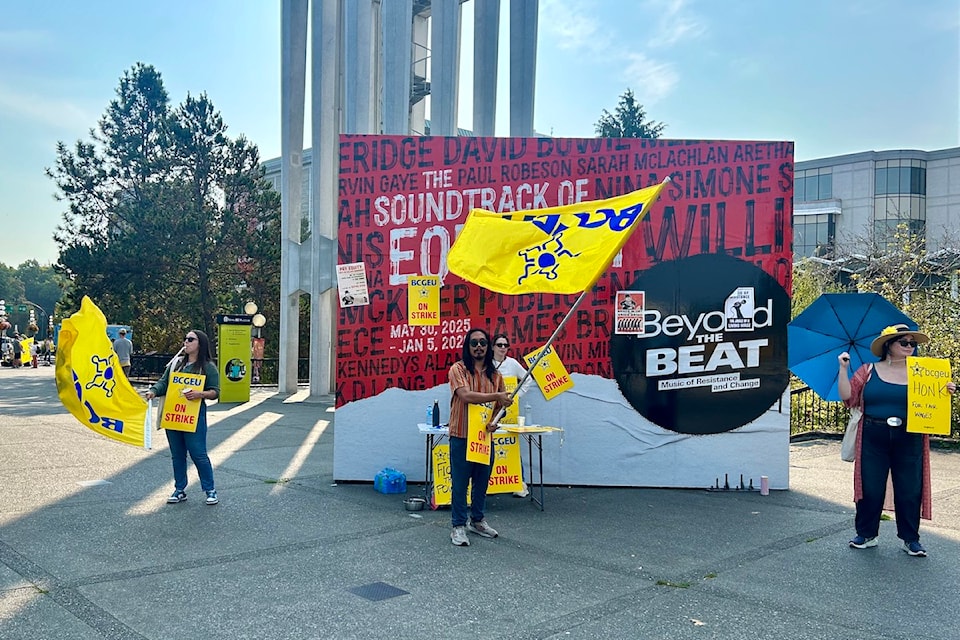Top Stories
Over 2,500 Workers Strike in B.C. as Talks With Government Stall

UPDATE: More than 2,500 government workers are on strike in British Columbia, disrupting essential services and raising tensions with provincial officials. The strike began on September 2, 2023, as workers from the B.C. General Employees’ Union (BCGEU) and the Professional Employees’ Association (PEA) demand better wages amid stalled negotiations.
Tourists visiting the Royal B.C. Museum in downtown Victoria faced an unexpected challenge on Wednesday. Striking workers set up picket lines at the museum’s entrance, urging visitors to reconsider crossing. While the museum remained open, attendance was notably low, with most interactions limited to an information booth staffed by a few workers.
The strike affects multiple sectors, with picket lines established in three cities. The BCGEU, representing around 34,000 government employees, and the PEA, which includes approximately 1,800 professionals, are voicing concerns over inadequate wage offers from the government. Workers range from liquor store employees to geoscientists, highlighting the breadth of the job action.
BCGEU president Paul Finch described the current workplace environment as “incredibly toxic,” emphasizing the need for improved conditions and compensation. Talks between the unions and the government have not resumed, with Finch stating, “There have been no negotiations.” He confirmed that the unions are seeking a 4% wage increase this year, followed by an additional 4.25% next year, a stark contrast to the government’s initial offer of 3.5% over two years.
In a response, Finance Minister Brenda Bailey indicated that the government is committed to fair wages but cited external economic pressures, including the ongoing U.S. trade war, as factors complicating negotiations. “The impacts of the U.S. trade war are being felt across Canada,” Bailey stated, underscoring the government’s fiscal challenges, including a rising budget deficit that reached $7.34 billion last year.
The strike comes amidst broader public sector negotiations, as over 450,000 public workers are renegotiating contracts. Other unions, including those representing healthcare workers and teachers, are also pushing for wage increases, and similar demands could lead to a ripple effect across the sector.
The BCGEU’s strategy is clear: Finch declared, “We’re going to strike as long as it takes, and escalate as required to get that deal.” As negotiations remain stalled, the impact on public services and day-to-day operations continues to grow.
The situation remains fluid, with the potential for further escalations. Observers are advised to monitor developments closely as both sides prepare for what could be a prolonged conflict. Stay tuned for updates as this story unfolds, impacting thousands of workers and essential services across British Columbia.
-

 Politics4 weeks ago
Politics4 weeks agoSecwepemc First Nation Seeks Aboriginal Title Over Kamloops Area
-

 World5 months ago
World5 months agoScientists Unearth Ancient Antarctic Ice to Unlock Climate Secrets
-

 Entertainment5 months ago
Entertainment5 months agoTrump and McCormick to Announce $70 Billion Energy Investments
-

 Science5 months ago
Science5 months agoFour Astronauts Return to Earth After International Space Station Mission
-

 Lifestyle5 months ago
Lifestyle5 months agoTransLink Launches Food Truck Program to Boost Revenue in Vancouver
-

 Technology3 months ago
Technology3 months agoApple Notes Enhances Functionality with Markdown Support in macOS 26
-

 Lifestyle3 months ago
Lifestyle3 months agoManitoba’s Burger Champion Shines Again Amid Dining Innovations
-

 Top Stories2 months ago
Top Stories2 months agoUrgent Update: Fatal Crash on Highway 99 Claims Life of Pitt Meadows Man
-

 Politics4 months ago
Politics4 months agoUkrainian Tennis Star Elina Svitolina Faces Death Threats Online
-

 Sports5 months ago
Sports5 months agoSearch Underway for Missing Hunter Amid Hokkaido Bear Emergency
-

 Politics5 months ago
Politics5 months agoCarney Engages First Nations Leaders at Development Law Summit
-

 Technology5 months ago
Technology5 months agoFrosthaven Launches Early Access on July 31, 2025





















